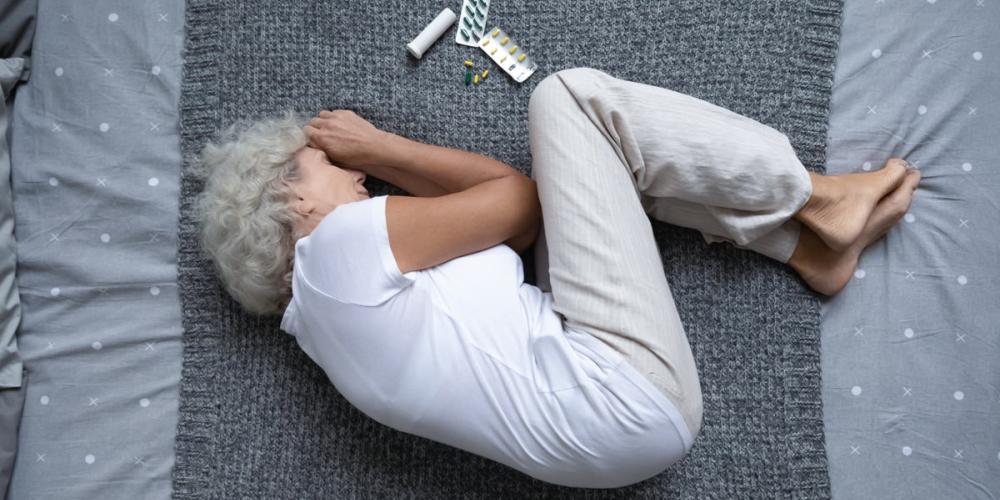
VUB research suggests pain education and lifestyle are important components of a multimodal approach to treat persistent pain
After cancer treatment, many patients continue to suffer from pain. About four out of ten cancer survivors have chronic pain complaints. The Pain in Motion research group at Vrije Universiteit Brussel is investigating which factors can reduce this chronic pain, and has found that pain education during and after cancer treatment plays an important role.
Astrid Lahousse, PhD researcher at the Pain in Motion research group: “You can take medication against pain, but phasing it out after cancer is necessary to reduce the risk of addiction, abuse and side effects. Many cancer patients report that they have insufficient knowledge about pain during or after cancer, and about what the possible pain management methods are. They also don’t know how to access support when needed. Pain in Motion offers that expertise, through research, education and treatment. Pain neuroscience education can lead to more active pain management methods, including lifestyle changes.”
The team is also examining lifestyle factors such as diet, exercise and use of stimulants and how they affect pain. This multimodal approach is necessary to make pain education as holistic as possible by unifying the mental, emotional and physical aspects of pain management.
Astrid Lahousse: “It is well known that lifestyle improvements can reduce mortality, concomitant diseases such as cardiovascular disease and cancer-related side effects such as fatigue and psychological problems. It is therefore also important to study different lifestyle factors during and after cancer in relation to the pain experience of cancer patients.”
Chronic pain due to stress
Chronic stress or distress is a common phenomenon after cancer treatment, due to fear of relapse. Stress supports the overproduction of inflammatory markers, which in turn can cause fatigue, disturbed sleep, depression and disease symptoms. In addition, increased inflammation in the body disrupts the sympathetic nervous system, which can increase pain. Sleep deprivation can also make people more irritable and sensitive to pain, creating a vicious circle of being unable to sleep because of the pain. Lahousse: “Early recognition and treatment of distress can lead to better pain management. The circle can be broken by teaching patients to look at their sleep differently.”
Movement
Being physically active after the cancer diagnosis increases the survival rate by up to 30%. Exercise also has a positive impact on fatigue, depression, quality of life and cardiovascular and musculoskeletal fitness, and can reduce pain. Lahousse: “Learning to build up exercise gradually can make our bodies more resistant to pain by activating pain-reducing pathways.”
Nutrition
Research has shown that severely overweight people have a greater chance of developing chronic pain symptoms. Astrid Lahousse : “At present, there is a lack of evidence of the added value of nutrition in chronic pain management in cancer survivors but this can certainly be promising and so more research is needed.”
Stimulants
It has long been proven that excessive use of stimulants has a negative effect on health. How does this relate to chronic pain? Astrid Lahousse: “Cigarettes and alcohol have a narcotic effect and this can of course provide short-term relief. But the long-term effects are not positive for people suffering from chronic pain. So here too it is important to study the effect of these stimulants in cancer survivors.”
These findings have been published in the Journal of Clinical Medicine. Pain in Motion is an international research group committed to improve the understanding of biopsychosocial mechanisms of pain through studies in different group populations with persistent pain. It also provides specialised care for patients with chronic pain. With the research group Rehabilitation Research, it is carrying out two new studies providing pain education to women with a history of breast cancer, who continue to struggle with persistent pain, in different regions of Belgium.
VUB and cancer research
VUB is an Urban Engaged University that is firmly committed to the fight against cancer through scientific research. Scientists from various fields – medicine, bioengineering, pharmacy, physiotherapy, psychology – work together on an interdisciplinary basis. Fundamental and clinical scientific research into cancer go hand in hand, which is why the UZ Brussel, VUB’s university hospital, is an important partner in research, therapy and care. More awareness about cancer is needed for its prevention and cure, while more awareness about scientific research benefits the search for remedies and patient well-being. VUB is therefore grateful for an initiative such as World Cancer Day on 4 February.
The VUB Foundation helps to secure financial resources for research. With the VUB Yamina Krossa Fund, the VUB Foundation supports breast cancer research and the development of a potential cancer vaccine by Professor Damya Laoui and her team (VUB-VIB). The VUB-UZB Paul De Knop Fund is another initiative, established by the former VUB rector who was diagnosed with melanoma shortly after his mandate ended. During treatment by Prof Bart Neyns and his team at the UZ Brussel, Paul De Knop underwent immunotherapy, a promising immune system-based cell therapy. As a grateful patient, he set up the fund to help more people in need of treatment, quickly and more affordably.
Want to know more? Contact Isabelle Marneffe (Isabelle.Marneffe@vub.be), director of the VUB Foundation. www.vubfoundation.be